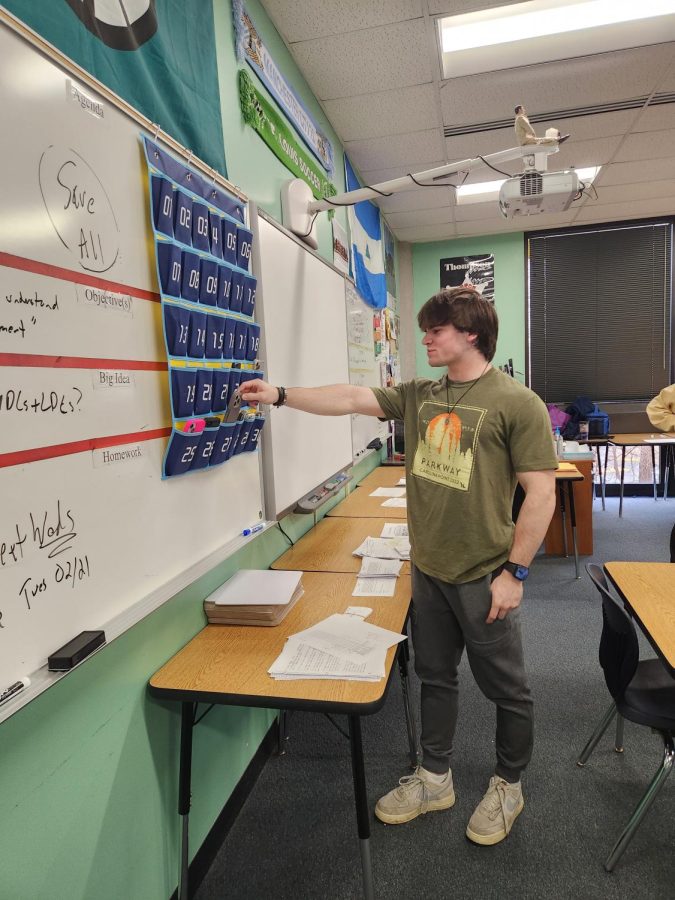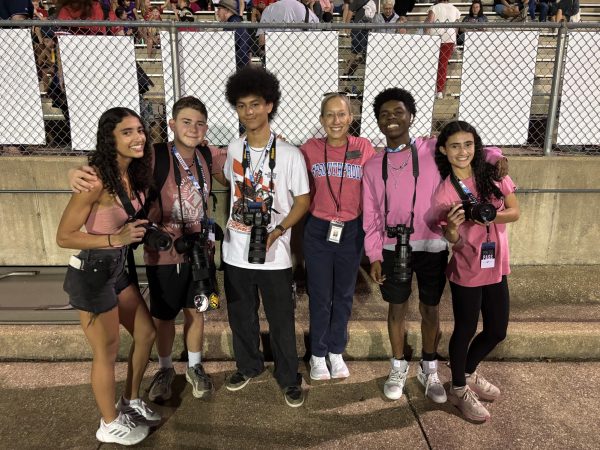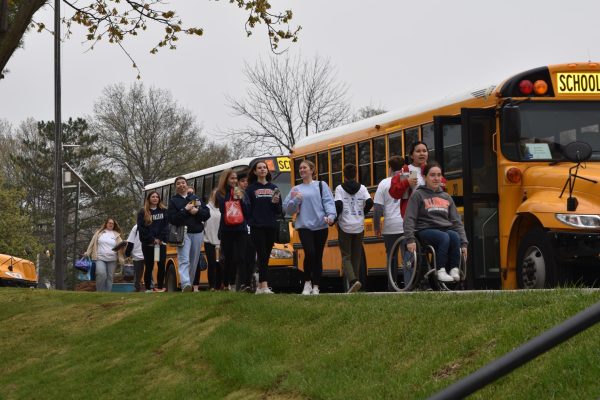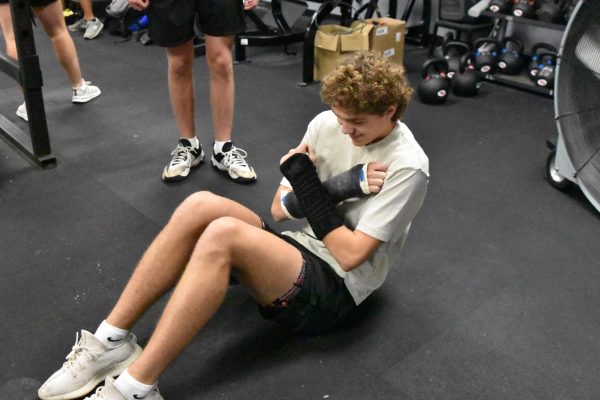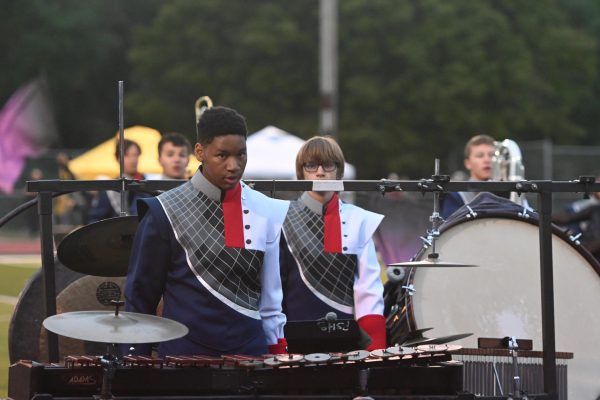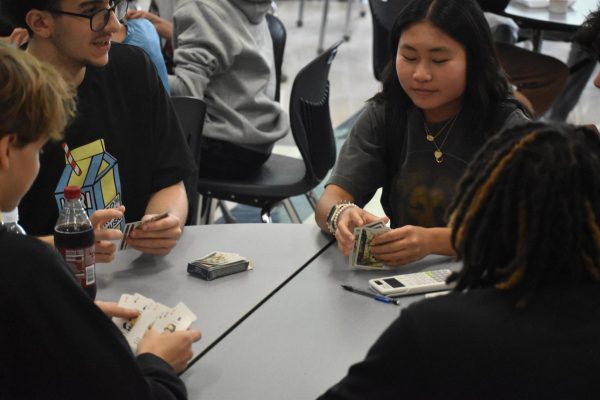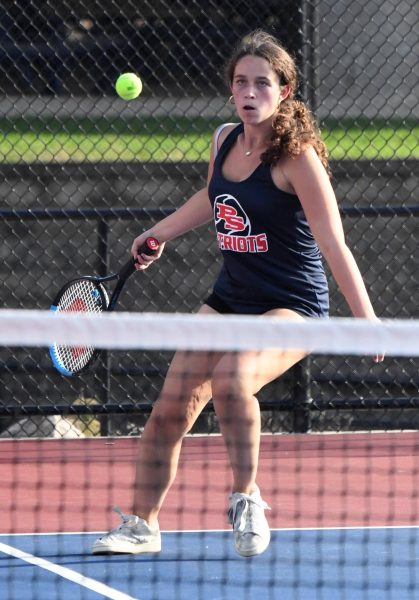No-Phone Zones
Teachers get creative to fight cell phone addiction
At the end of class, junior Caleb Schellman reaches for his phone in Mr. Morris’ AP Human Geography class.
“You used to call me on my cell phone…”
The key word is “used to” because in some classes, there will no longer be calling on cell phones.
All across South, teachers are either starting to or already have implemented either optional or mandatory cell phone policies.
One of these teachers is English teacher Melissa Gebhard. She said she started an optional cell phone policy several years ago, and continues it to this day. With her system, students put their phones in a designated pocket slot, and they can be exempt from part of her final if they turn in their phones the entire semester.
Gebhard expressed how before this system, phones were a major struggle in her class.
“I was spending way too much time trying to police phones. I was losing so much instructional time and connection with kids too,” she said.
However, she then got introduced to the system through her own Parkway connections.
“I actually stole it from a teacher at North. She had set up a phone-spa type thing and I said I need to do that,” Gebhard said. “I wanted to focus on connecting with kids and teaching and not it constantly being an issue.”
Furthermore, Gebhard’s system has had a few changes over the years. She explained how originally she had a system where a cadet teacher would check off students’ names as they turned in their phones. Then, another teacher in the social studies department got a wall pocket holder thing and she decided to implement that in her classroom.
Additionally, Gebhard went into detail about the benefits this system has created in her classroom. She explained how her students are more engaged in the lessons and also how being away from their phones benefits their mental health. She also talked about how despite her system, she still gives students a five-minute break in the middle of class for them to check their phones.
“I understand that we live in a society where it’s expected that you respond immediately whether that’s a good or bad thing or not. But…if we have a 90-minute block you need to take a break anyways so you can check in…send the text you need to send…and then come back to work,” Gebhard said.
Moreover, Gebhard isn’t the only teacher at South who participates in the phone program. Social Studies teacher Carrie Steele also has a similar system in her class. Instead of the final, she will drop the lowest test or project grade that you have at the end of the semester, but it still works out.
“I really think the kids are more engaged, more with me and what is going on in class. They also talk to each other a little more!” she said.
In ways her class has changed, Steele said, “They are forced to talk to me more… I think the kids are more focused, they are more with me during class. Most teachers have struggled with phones the last couple of years. It is so frustrating and defeating to try and do your best lessons and really engage the kids and all you see is their head down on their phone. I work really hard at my job and I just think if kids give me a chance and follow along they will like class!”
Although it’s less often than Gebhard, Steele also supplies time for students to be on their phone in class during select times.
“If I am done early they can grab them, or on days we do group work, research on their own…. Or I make them put them away for an hour and then they can grab it the last 30 min,” she said.
One may expect that with taking away phones, there would be pushback from students. However, both teachers expressed that there is actually very little trouble in their classrooms surrounding the system.
“If they don’t want to do it they just don’t sign it!” Steele said, while Gedhard explained that around 80% of her students partake in the system.
Nevertheless, there are still some issues with electronics in the classroom, especially surrounding headphones or AirPods.
“Overall for everyone. it is just super annoying to continue to remind them to take out their AirPods. That now is killing me!!! Most freshmen put their phone in as soon as they walk in, but the juniors and seniors need to be reminded more,” Steele said.
Gebhard said that some students will put their phone in the cubby but keep their AirPods and listen to music from across the room. She also said that Apple Watches can be a problem because students will still get texts or notifications on those.
In addition, other parts of South are starting to adapt to the phone program as well. Science teacher Meghan McGowan is also participating in the system, but she has put her own twist to it. Instead of letting it be optional for students, McGowan requires that they put their phones up.
“Mine’s just the expectation,” she said. “The expectation is that students come in for class and their phone goes in the drawer and they get it back at the end of class,” she said.
However, even with the differences, McGowan still experiences a lot of benefits because of the system.
“Oh my gosh, there’s so many benefits. The number one thing is that students actually talk to each other. It’s crazy, but when I ask them to work in pairs they actually do it,” she said. “That’s been really nice and I think it’s rewarding for students to actually get to learn from each other…”
McGowan said that there have been a few students that have complained about the system, but that she just reinforces that it’s the rule. Otherwise, there’s not a lot of issues.
“I haven’t had a lot of trouble with it. The parents have all supported this decision…all of my students have understood the benefits of it,” she said. “They know that if there ever was an emergency, they could say ‘Hey Mrs. McGowan, I need to have my phone on my today’ and I would say sure, no problem.”
McGowan is also no stranger to South. A 2013 graduate, McGowan talked about how teachers would just take phones if they were becoming an issue and students would pick them up from the office at the end of the day. Now, it’s up for the teachers to establish phone policies.
While teachers are the ones creating the system, students are also very much involved. Junior Avery Schaefer is one student who is participating in the program.
Schaefer is a part of Gebhard’s class, and said that she is participating so she doesn’t have to do the final in Creative Writing 2. She said that while her Chromebook and other devices have not been a distraction, not having her phone has had no benefit in her ability to focus. However, she said she would be able to last the whole semester without her phone.
Senior Joel Raj also used to participate in the program in social studies teacher Matt Morris’ class, but decided to opt out.
“I opted out because I liked doing the challenges (class work) and they didn’t take me very long to complete so it wasn’t worth it to me,” he said.
Additionally, Raj said that he didn’t notice a difference in his learning when having a phone and not having a phone. He also said that he wouldn’t participate in the program again for that specific teacher. However, he does have another class doing the program.
“I have one teacher doing the program and I am participating,” he said.


